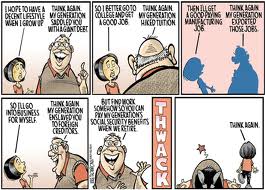
Inspired by a string of generational reports from the
PEW research center, NPR has recently focused on generational differences in politics and economics. All the stories in their “
Generational Politics” segment follow the four generations that currently constitute the voting population. The series looks at typical economic situations given the economic downturn, political leanings, value systems and their projected political sympathies in the 2012 election.
The relationship between age and voter turnout has intrigued political scientists at least since 1960. Two rivaling theories are set out to answer the question of age and political alignment. The answer is likely to be a little bit of both.
 "Kids nowadays! Hmpf!" Whether you're 5 or 85, at some point you might unwittingly have been dragged into a generational comparison in which your age cohort is made out to look ruder, lazier or more spoiled than the bygone youth of the spokesperson. The statement is often followed up with a sentence that starts with "In my days.." Usually we attribute this type of sentiment to the occasional hissy fits endured by otherwise beloved older relatives whenever the need to blow off some steam escalates to intolerable proportions. And often it is better respond with an approving nod than to go into a drawn-out and probably futile explanation about "how things have changed" and how the old ways of doing things simply won't work anymore. Or we reason that the curmudgeon is probably right anyway, that we're all degenerating under moral standards in free fall.
"Kids nowadays! Hmpf!" Whether you're 5 or 85, at some point you might unwittingly have been dragged into a generational comparison in which your age cohort is made out to look ruder, lazier or more spoiled than the bygone youth of the spokesperson. The statement is often followed up with a sentence that starts with "In my days.." Usually we attribute this type of sentiment to the occasional hissy fits endured by otherwise beloved older relatives whenever the need to blow off some steam escalates to intolerable proportions. And often it is better respond with an approving nod than to go into a drawn-out and probably futile explanation about "how things have changed" and how the old ways of doing things simply won't work anymore. Or we reason that the curmudgeon is probably right anyway, that we're all degenerating under moral standards in free fall.


